七年级报纸电子版·深圳版(第17期)
(2014春)七年级报纸电子版·牛津深圳版(第18期)
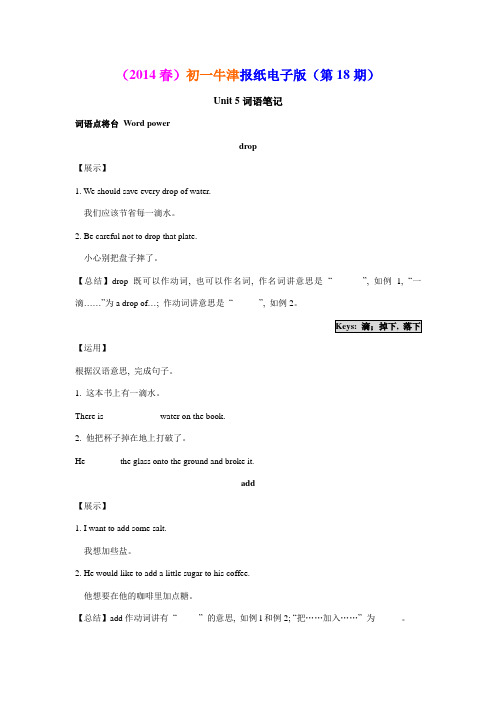
(2014春)初一牛津报纸电子版(第18期)Unit 5词语笔记词语点将台Word powerdrop【展示】1. We should save every drop of water.我们应该节省每一滴水。
2. Be careful not to drop that plate.小心别把盘子摔了。
【总结】drop既可以作动词, 也可以作名词, 作名词讲意思是“_______”, 如例1, “一滴……”为a drop of…; 作动词讲意思是“______”, 如例2。
Keys: 滴;掉下, 落下【运用】根据汉语意思, 完成句子。
1. 这本书上有一滴水。
There is __ _______ __ water on the book.2. 他把杯子掉在地上打破了。
He _______ the glass onto the ground and broke it.add【展示】1. I want to add some salt.我想加些盐。
2. He would like to add a little sugar to his coffee.他想要在他的咖啡里加点糖。
【总结】add作动词讲有“_____”的意思, 如例l和例2; “把……加入……”为_____。
Keys: 增加, 添加;add…to…【运用】根据汉语意思, 完成句子。
3. 他给这杯水里加了些糖。
He _____ some sugar ______ this glass of water.through【展示】1. The water travels through the pipes.水从管道经过。
2. The sand ran through my fingers.沙子从我的手指缝间漏了下去。
【总结】through可作介词, 意思是“____”, 一般用于动词之后, 如例1, 例2。
Key: 通过, 穿过【运用】根据汉语意思, 完成句子。
七年级报纸电子版·深圳版(第10期)
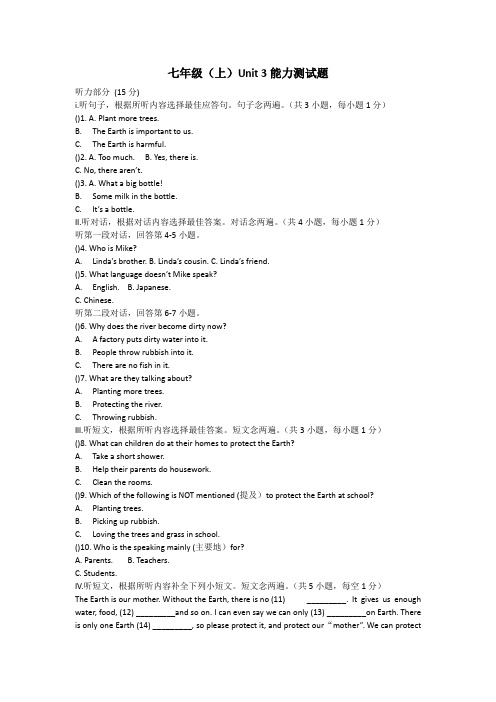
七年级(上)Unit 3能力测试题听力部分(15分)i.听句子,根据所听内容选择最佳应答句。
句子念两遍。
(共3小题,每小题1分)()1. A. Plant more trees.B. The Earth is important to us.C. The Earth is harmful.()2. A. Too much. B. Yes, there is.C. No, there aren’t.()3. A. What a big bottle!B. Some milk in the bottle.C. It’s a bottle.II.听对话,根据对话内容选择最佳答案。
对话念两遍。
(共4小题,每小题1分)听第一段对话,回答第4-5小题。
()4. Who is Mike?A. Linda’s brother.B. Linda’s cousin.C. Linda’s friend.()5. What language doesn’t Mike speak?A. English.B. Japanese.C. Chinese.听第二段对话,回答第6-7小题。
()6. Why does the river become dirty now?A. A factory puts dirty water into it.B. People throw rubbish into it.C. There are no fish in it.()7. What are they talking about?A. Planting more trees.B. Protecting the river.C. Throwing rubbish.Ill.听短文,根据所听内容选择最佳答案。
短文念两遍。
(共3小题,每小题1分)()8. What can children do at their homes to protect the Earth?A. Take a short shower.B. Help their parents do housework.C. Clean the rooms.()9. Which of the following is NOT mentioned (提及)to protect the Earth at school?A. Planting trees.B. Picking up rubbish.C. Loving the trees and grass in school.()10. Who is the speaking mainly (主要地)for?A. Parents.B. Teachers.C. Students.IV.听短文,根据所听内容补全下列小短文。
(2014春)七年级报纸电子版·牛津深圳版(第06期)
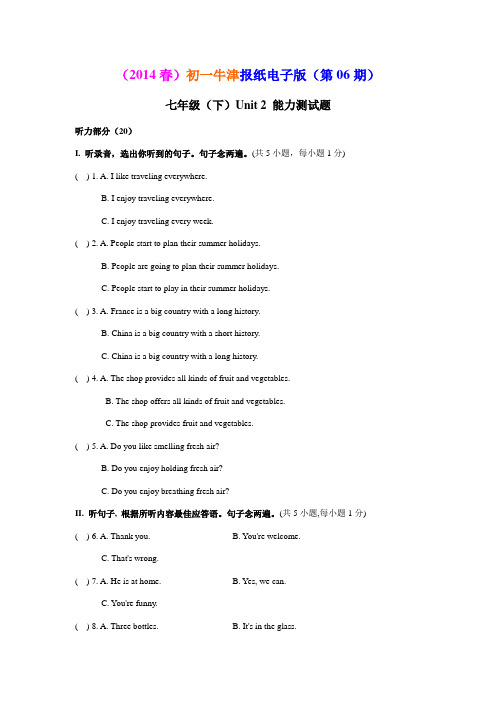
(2014春)初一牛津报纸电子版(第06期)七年级(下)Unit 2 能力测试题听力部分(20)I. 听录音,选出你听到的句子。
句子念两遍。
(共5小题,每小题1分)( ) 1. A. I like traveling everywhere.B. I enjoy traveling everywhere.C. I enjoy traveling every week.( ) 2. A. People start to plan their summer holidays.B. People are going to plan their summer holidays.C. People start to play in their summer holidays.( ) 3. A. France is a big country with a long history.B. China is a big country with a short history.C. China is a big country with a long history.( ) 4. A. The shop provides all kinds of fruit and vegetables.B. The shop offers all kinds of fruit and vegetables.C. The shop provides fruit and vegetables.( ) 5. A. Do you like smelling fresh air?B. Do you enjoy holding fresh air?C. Do you enjoy breathing fresh air?II. 听句子, 根据所听内容最佳应答语。
句子念两遍。
(共5小题,每小题1分) ( ) 6. A. Thank you. B. You're welcome.C. That's wrong.( ) 7. A. He is at home. B. Yes, we can.C. You're funny.( ) 8. A. Three bottles. B. It's in the glass.C. It's a cup.( ) 9. A. Yes, I am. B. Yes, I do.C. Yes, I'd like to.( ) 10. A. I like to go there by bus. B. It is not here.C. You can go there by bus.III.听对话,根据对话内容选择最佳答案。
2021-2022学年学英语报七年级第17期答案外研版基础版
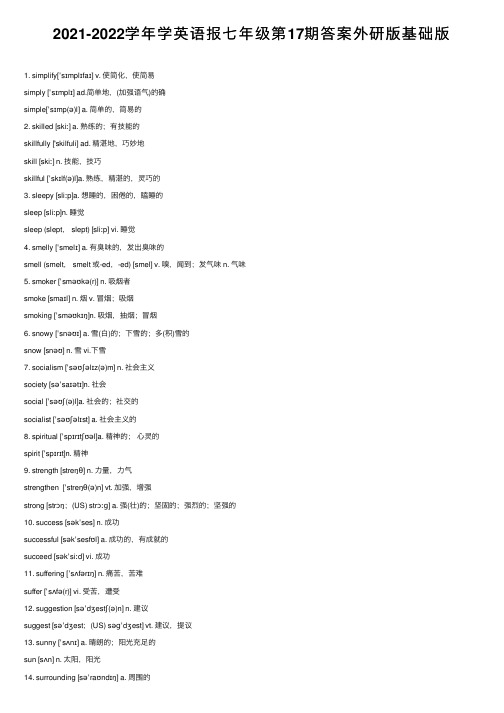
2021-2022学年学英语报七年级第17期答案外研版基础版1. simplify[ˈsɪmplɪfaɪ] v. 使简化,使简易simply [ˈsɪmplɪ] ad.简单地,(加强语⽓)的确simple[ˈsɪmp(ə)l] a. 简单的,简易的2. skilled [skiː] a. 熟练的;有技能的skillfully ['skilfuli] ad. 精湛地,巧妙地skill [skiː] n. 技能,技巧skillful [ˈskɪlf(ə)l]a. 熟练,精湛的,灵巧的3. sleepy [sliːp]a. 想睡的,困倦的,瞌睡的sleep [sliːp]n. 睡觉sleep (slept, slept) [sliːp] vi. 睡觉4. smelly [ˈsmelɪ] a. 有臭味的,发出臭味的smell (smelt, smelt 或-ed,-ed) [smel] v. 嗅,闻到;发⽓味 n. ⽓味5. smoker [ˈsməʊkə(r)] n. 吸烟者smoke [smaɪl] n. 烟 v. 冒烟;吸烟smoking [ˈsməʊkɪŋ]n. 吸烟,抽烟;冒烟6. snowy [ˈsnəʊɪ] a. 雪(⽩)的;下雪的;多(积)雪的snow [snəʊ] n. 雪 vi.下雪7. socialism [ˈsəʊʃəlɪz(ə)m] n. 社会主义society [səˈsaɪətɪ]n. 社会social [ˈsəʊʃ(ə)l]a. 社会的;社交的socialist [ˈsəʊʃəlɪst] a. 社会主义的8. spiritual [ˈspɪrɪtʃʊəl]a. 精神的;⼼灵的spirit [ˈspɪrɪt]n. 精神9. strength [streŋθ] n. ⼒量,⼒⽓strengthen [ˈstreŋθ(ə)n] vt. 加强,增强strong [strɔŋ;(US) strɔːɡ] a. 强(壮)的;坚固的;强烈的;坚强的10. success [səkˈses] n. 成功successful [səkˈsesfʊl] a. 成功的,有成就的succeed [səkˈsiːd] vi. 成功11. suffering [ˈsʌfərɪŋ] n. 痛苦,苦难suffer [ˈsʌfə(r)] vi. 受苦,遭受12. suggestion [səˈdʒestʃ(ə)n] n. 建议suggest [səˈdʒest;(US) səɡˈdʒest] vt. 建议,提议13. sunny [ˈsʌnɪ] a. 晴朗的;阳光充⾜的sun [sʌn] n. 太阳,阳光14. surrounding [səˈraʊndɪŋ] a. 周围的surround [səˈraʊnd]vt. 围绕;包围15. survival [səˈvaɪv(ə)l] n. 存活,幸存survive [səˈvaɪv] v.⽣存,存活,幸免于难。
(2014春)七年级报纸电子版·牛津深圳版(第15期)

(2014春)初一牛津报纸电子版(第15期)综合知识专练( For Unit 3-4)词语狙击Vocabularyn. radio, programme, pet, towel, bottom, airport, pine, branch, root, example, gas, oxygen, furniture, disease, holev. mean, allow, apologize, lead, bark, wake, appear, act, climb, save, discuss, fight, produce, imagine, dig, carryadj. blind, helpful, dark, major, harmful, convenientadv. anywhere, finallypron. nothingprep. against1. arrive at2. by oneself3. lead (sb.) to4. fall asleep5. wake up6. get down7. fire engine8. take in9. come from 10. for example 11. in fact 12. look around 13. (be) made of 14. millions of 15. (be) good for完璧归赵根据句意及首字母提示填写单词, 使句子完整、通顺。
1. My father likes to listen to the r ______in the morning every day.2. If you are hungry, there is an apple at the b______ of my bag. You can eat it.3. The dog suddenly started b______ at us.4. My uncle will arrive at the a _______ in two hours, and then he will fly to Beijing.5. He was so brave that he c _________ to the top of the high mountain at last.6. The old man likes watching TV. He likes all kinds of p_______ on TV.7. Our teacher often gives us some e_______ to explain the difficult words.8. Trees are very important because they can give out o________ for us to breathe.9. There is a lot of new f _______ in his living room, such as the sofa and the table.10. It is d______ outside at night, but the man has to go out to work.中西合璧根据句意及汉语提示填写单词,使句子完整、通顺。
(2014春)七年级报纸电子版·牛津深圳版(第24期)

(2014春)七年级报纸电⼦版·⽜津深圳版(第24期)(2014春)初⼀⽜津报纸电⼦版(第24期)综合知识专练( For Unit 5-6)词语狙击Vocabularyn. drop, journey, quantity, experiment, salt, voice, chemical, pipe, bit, bank, change, electricity, conversation, rule; wire, moment, battery, cooker, fridgev. drop, add, return, form, continue, reply, connect, lock, test, tidy, touchadj. fresh, valuable, foolishadv. onpron. anyoneprep. through1. turn off2. add ... to ...3. a bit4. part of5. pocket money6. be made up of7. dry up8. a packet of9. in a way 10. (be) connected to 11. power station12. washing machine 13. switch off 14. tidy up 15. air conditioner 16. have a shower 17. instead of 18. make sure 19. start a fire 20. safety tips完璧归赵根据句意及⾸字母提⽰填写单词, 使句⼦完整、通顺。
1. The TV is o_______. Please help me switch it off.2. We plan to go to Harbin by air because it’s a long j________ by train.3. Lily works as a hostess in a TV station because she has a sweet v______ and she’s talkative.4. This gold ring is very v_______ and it costs lots of money.5. I’m afraid we can’t go t_______ the forest. We don’t know the way.6. After you finish reading these books, please r_______ them to the library.7. Don’t t_________ these plates. They are made of glass and they are easy to break.8. My family has a lot of home r________, and each of us in my family needs to follow.9. The house is clean and t________. There’s no rubbish on the ground.10. A______ who breaks the law should be sent into prison(监狱)中西合璧根据句意及汉语提⽰填写单词, 使句⼦完整、通顺。
(2014秋)七年级报纸电子版·牛津深圳版(第05期)

(2014秋)初一牛津报纸电子版(第05期)语法运用Grammar in use【一般现在时态】一、含义:1. 表示经常性、习惯性的动作或存在的状态。
例如: I go to the park by bus. 我乘公交车去这个公园。
2. 表示主语的特征、性格、能力、爱好等。
例如: He can dance. 他会跳舞。
3. 表示客观真理。
例如: The Earth goes around the sun. 地球围绕着太阳转。
二、结构:肯定式否定式疑问式回答I work I don’t work. Do you work? Yes, I do. / No, I don’t. You like singing. You don’t like singing. Do you like singing? Yes, I do. / No, I don’t.We often go to the zoo. We don’t often go tothe zoo.Do you often go to thezoo?Yes, we do. / No, wedon’t.They want to have supper. They don’t want tohave supper.Do they want to havesupper?Yes, they do. / No, theydon’t.He (She, It) eats a lot. He (She, It) doesn’teat a lot.Does he (she, it) eat alot?Yes, he (she, it) does. /No, he (she, it) doesn’t.【频度副词及频度副词短语】一、频度副词是用来表示动作频率的词, 包括: often, usually, always, sometimes, seldom, never 等。
七年级报纸电子版·深圳版(第7期)

七年级(上)Units 1-2 综合能力测试题听力部分(15分)i.听句子,根据所听内容选择最佳应答句。
句子念两遍。
(共3小题,每小题1分)()1. A. Because my bike is broken.B. I am from Japan.C. I like it very much.()2. A. Ben is my friend. B. At nine.C. Chinese.()3. A. Yes, she does. B. Yes, she is.C. Yes, she was.II.听对话,根据对话内容选择最佳答案。
对话念两遍。
(共4小题,每小题1分)听第一段对话,回答第4-5小题。
()4. Where are the speakers?A. In a school.B. In a hospital.C. At home.()5. What should the young man do?A. Eat more vegetables.B. Study hard.C. Have a good rest.听第二段对话,回答第6-7小题。
()6. How many brothers and sisters does Lily have?A. 3.B. 4.C.6.()7. What does Lily usually have for breakfast?A. Bread and fruit.B. Fish and milk.C. Bread and milk.III.听短文,根据所听内容选择最佳答案。
短文念两遍。
(共3小题,每小题1分)()8. How old is Kelsey?A. Eight.B. Nine.C. Ten.()9. What does Jane do?A. She is a doctor.B. She is a teacher.C. She is a student.()10. What can we know about Eric?A. He is Jack Hand, s brother.B. He is very friendly.C. He is eight years old.IV.听短文,根据所听内容补全下列小短文。
(2014春)七年级报纸电子版·牛津深圳版(第23期)
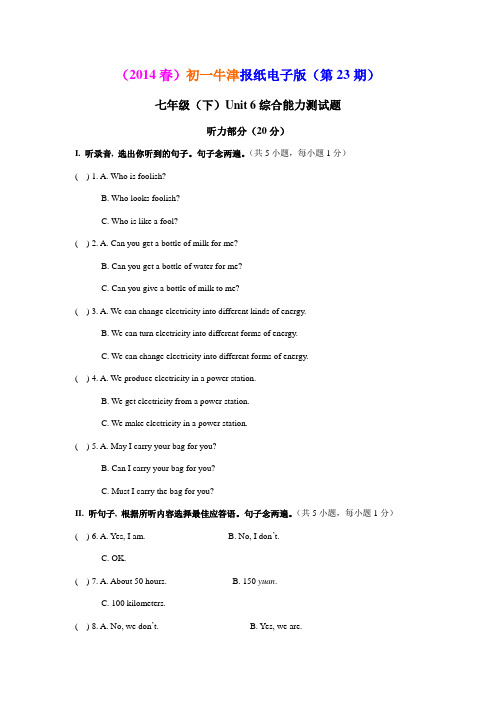
(2014春)初一牛津报纸电子版(第23期)七年级(下)Unit 6综合能力测试题听力部分(20分)I. 听录音, 选出你听到的句子。
句子念两遍。
(共5小题,每小题1分)( ) 1. A. Who is foolish?B. Who looks foolish?C. Who is like a fool?( ) 2. A. Can you get a bottle of milk for me?B. Can you get a bottle of water for me?C. Can you give a bottle of milk to me?( ) 3. A. We can change electricity into different kinds of energy.B. We can turn electricity into different forms of energy.C. We can change electricity into different forms of energy.( ) 4. A. We produce electricity in a power station.B. We get electricity from a power station.C. We make electricity in a power station.( ) 5. A. May I carry your bag for you?B. Can I carry your bag for you?C. Must I carry the bag for you?II. 听句子, 根据所听内容选择最佳应答语。
句子念两遍。
(共5小题,每小题1分)( ) 6. A. Yes, I am. B. No, I don’t.C. OK.( ) 7. A. About 50 hours. B. 150 yuan.C. 100 kilometers.( ) 8. A. No, we don’t. B. Yes, we are.C. Yes, you are.( ) 9. A. Yes, I can. B. I can’t play the guitar.C. I can sing.( ) 10. A. Yes, you did. B. Yes, you can.C. Yes, you are.III. 听对话, 根据对话内容选择最佳答案。
(2014春)七年级报纸电子版·牛津深圳版(第16期)
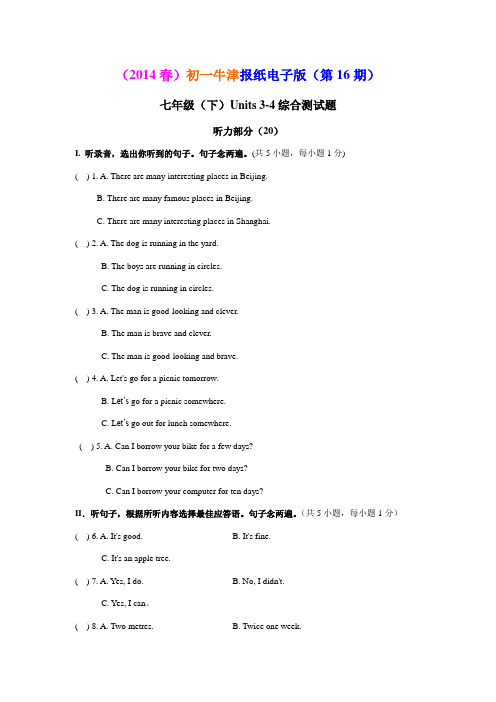
(2014春)初一牛津报纸电子版(第16期)七年级(下)Units 3-4综合测试题听力部分(20)I. 听录音,选出你听到的句子。
句子念两遍。
(共5小题,每小题1分)( ) 1. A. There are many interesting places in Beijing.B. There are many famous places in Beijing.C. There are many interesting places in Shanghai.( ) 2. A. The dog is running in the yard.B. The boys are running in circles.C. The dog is running in circles.( ) 3. A. The man is good-looking and clever.B. The man is brave and clever.C. The man is good-looking and brave.( ) 4. A. Let's go for a picnic tomorrow.B. L et‟s go for a picnic somewhere.C. L et‟s go out for lunch somewhere.( ) 5. A. Can I borrow your bike for a few days?B. Can I borrow your bike for two days?C. Can I borrow your computer for ten days?II.听句子,根据所听内容选择最佳应答语。
句子念两遍。
(共5小题,每小题1分)( ) 6. A. It's good. B. It's fine.C. It's an apple tree.( ) 7. A. Yes, I do. B. No, I didn't.C. Yes, I can。
英语周报七年级牛津(SZY)第17期

深圳牛津 七年级 第17期 单元检测
导写桥
Unit 5 话题习作
假设当今到月球旅游已经成为一件很容易
的事情。你暑假时和家人去了一次月球旅
游,请根据以下表格中的内容提示向你们班 的同学叙述你的这次旅程。词数:80以上。 题目和结尾已给出,不计入总词数。
第一版 导写桥
旅游时间
今年暑假
need to _____ every day. A. do exercises C. be busy
第二版 笔试部分
B. take a trip
(A )12. John is interested in many subjects _____, Science, Art, Music and so on. A. such as B. for example C. except for (C )13. I will _____ on the Moon and show them to my classmates when I am back. A. write many letters B. make many friends C. take many photos
第二版 笔试部分
( C )2. All mothers worry about their children when they first leave home. A. drive B. come back C. go away from ( B )3. You have to be quick, or you can’t catch the train. A. may B. must C. shall
第一版 导写桥
2. It takes sb ... (time) to do sth 意为“某 人 花费……(时间)做某事”。 【例】It takes me half an hour to walk to school every day. 每天我要花半个小时走路上学。 【译】我们花了大约4天的时间坐飞船到达那 里。 It took us about four days to get there in a spaceship. ___________________________________
《中学生学习报》数学周刊七年级下沪科第17期
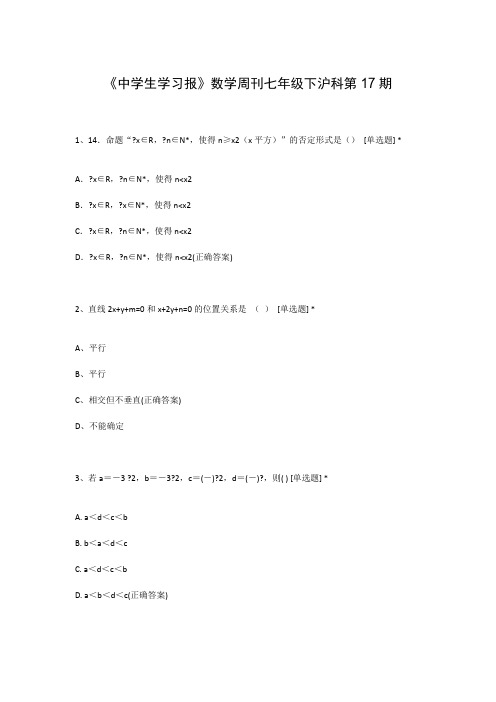
《中学生学习报》数学周刊七年级下沪科第17期1、14.命题“?x∈R,?n∈N*,使得n≥x2(x平方)”的否定形式是()[单选题] *A.?x∈R,?n∈N*,使得n<x2B.?x∈R,?x∈N*,使得n<x2C.?x∈R,?n∈N*,使得n<x2D.?x∈R,?n∈N*,使得n<x2(正确答案)2、直线2x+y+m=0和x+2y+n=0的位置关系是()[单选题] *A、平行B、平行C、相交但不垂直(正确答案)D、不能确定3、若a=-3 ?2,b=-3?2,c=(-)?2,d=(-)?,则( ) [单选题] *A. a<d<c<bB. b<a<d<cC. a<d<c<bD. a<b<d<c(正确答案)4、已知二次函数f(x)=2x2-x+2,那么f(0)的值为()。
[单选题] *122(正确答案)835、9.(2020·课标Ⅱ)已知集合A={x||x|<3,x∈Z},B={x||x|>1,x∈Z},则A∩B=( ) [单选题] *A.?B.{-3,-2,2,3}C.{-2,0,2}D.{-2,2}(正确答案)6、5.在数轴上点A,B分别表示数-2,-5,则A,B两点之间的距离可表示为()[单选题] *A.-2+(-5)B.-2-(-5)(正确答案)C.(-5)+2D(-5)-27、已知点A(4,6),B(-4,0),C、(-1,-4),那么()[单选题] *A、AB⊥ACB、AB⊥ACCAB⊥BC(正确答案)D、没有垂直关系8、二次函数y=3x2-4x+5的一次项系数是()。
[单选题] * 34(正确答案)519、7.下列运算正确的是()[单选题] *A.-2(3X-1)=-6X-1B.-2(3X-1)=-6X+1C.-2(3X-1)=-6X-2D.-2(3X-1)=-6X+2(正确答案)10、24.不等式x-3>5的解集为()[单选题] *A. x > 1B. x > 2(正确答案)C. x > 3D. x > 411、15.下列数中,是无理数的为()[单选题] *A.-3.14B.6/11C.√3(正确答案)D.012、6.过多边形的一个顶点能引出7条对角线,则这个多边形是()边形.[单选题]* A.七B.八C.九D.十(正确答案)13、43、长度分别为3cm,5cm,7cm,9cm的四根木棒,能搭成(首尾连结)三角形的个数为[单选题] *A.1B.2C.3(正确答案)D.414、8.如果直角三角形的三条边为2,4,a,那么a的取值可以有()[单选题] *A. 0个B. 1个C. 2个D. 3个(正确答案)15、如果平面a和平面β有公共点A,则这两个平面就相交()[单选题] *A、经过点A的一个平面B、经过点A的一个平面(正确答案)C、点AD、无法确定16、4、已知直角三角形的直角边边长分别是方程x2-14x+48=0的两个根,则此三角形的第三边是()[单选题] *A、6B、10(正确答案)C、8D、217、若2? =3,2?=4,则23??2?等于( ) [单选题] *A. 7B. 12C. 432(正确答案)D. 10818、23.最接近﹣π的整数是()[单选题] *A.3B.4C.﹣3(正确答案)D.﹣419、下面哪个式子的计算结果是9﹣x2() [单选题] *A. (3﹣x)(3+x)(正确答案)B. (x﹣3)(x+3)C. (3﹣x)2D. (3+x)220、20.已知集合A={x|x2(x的平方)-2 023x+2 022<0},B={x|x<a},若A?B,则实数a的取值范围是___. [单选题] *A a≥2022(正确答案)B a>2022C a<2022D a≥121、下列语句中,描述集合的是()[单选题] *A、比1大很多的实数全体B、比2大很多的实数全体C、不超过5的整数全体(正确答案)D、数轴上位于原点附近的点的全体22、46.若a+b=7,ab=10,则a2+b2的值为()[单选题] * A.17B.29(正确答案)C.25D.4923、已知2x=8,2y=4,则2x+y=()[单选题] *A 、32(正确答案)B 、33C、16D、424、8. 估计√13?的值在() [单选题] *A、1和2之间B、2和3之间C、3和4之间(正确答案)D、4和5之间25、下列各对象可以组成集合的是()[单选题] *A、与1非常接近的全体实数B、与2非常接近的全体实数(正确答案)C、高一年级视力比较好的同学D、与无理数相差很小的全体实数26、5.下列结论不正确的是[单选题] *A.若a > 0,b > 0,则a + b > 0B.若a < 0,b < 0,则a + b < 0C.若a > 0,b < 0,且|a| > |b|,则a + b > 0D.若a < 0,b > 0,且|a| > |b|,则a + b > 0(正确答案)27、下列说法中,正确的是()[单选题] *A、第一象限角是锐角B、第一象限角是锐角(正确答案)C、小于90°的角是锐角D、第一象限的角不可能是钝角28、4.(2020·天津,1,5分)设全集U={-3,-2,-1,0,1,2,3},集合A={-1,0,1,2},B={-3,0,2,3},则A∩(?UB)=( ) [单选题] *A.{-3,3}B.{0,2}C.{-1,1}(正确答案)D.{-3,-2,-1,1,3}29、的值为()[单选题] *A.-2B. 0C. 1(正确答案)D. 230、12.下列方程中,是一元二次方程的为()[单选题] *A. x2+3xy=4B. x+y=5C. x2=6(正确答案)D. 2x+3=0。
(2014春)七年级报纸电子版·牛津深圳版(第11期)
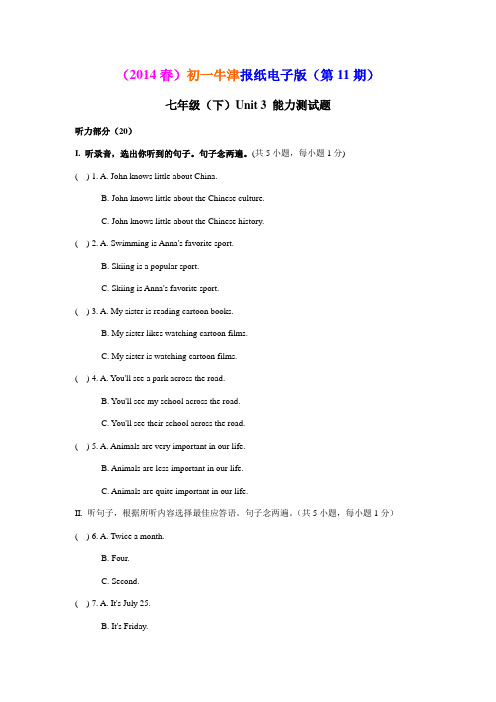
(2014春)初一牛津报纸电子版(第11期)七年级(下)Unit 3 能力测试题听力部分(20)I. 听录音,选出你听到的句子。
句子念两遍。
(共5小题,每小题1分)( ) 1. A. John knows little about China.B. John knows little about the Chinese culture.C. John knows little about the Chinese history.( ) 2. A. Swimming is Anna's favorite sport.B. Skiing is a popular sport.C. Skiing is Anna's favorite sport.( ) 3. A. My sister is reading cartoon books.B. My sister likes watching cartoon films.C. My sister is watching cartoon films.( ) 4. A. You'll see a park across the road.B. You'll see my school across the road.C. You'll see their school across the road.( ) 5. A. Animals are very important in our life.B. Animals are less important in our life.C. Animals are quite important in our life.II. 听句子,根据所听内容选择最佳应答语。
句子念两遍。
(共5小题,每小题1分)( ) 6. A. Twice a month.B. Four.C. Second.( ) 7. A. It's July 25.B. It's Friday.C. It's 6:18.( ) 8. A. Donuts.B. English.C. China.( ) 9. A. Yes, I won't.B. Yes, I'd like to.C. Yes, I do.( ) 10. A. One hundred and twenty yuan.B. On hundred and eight pages.C. Ten years old.III. 听对话,根据对话内容选择最佳答案。
学英语报纸深圳(S)七下暑假专版答案

七年级深圳(S)暑假专版参考答案第1版暑假作业(一)词汇与句型篇词汇运用Ⅰ. 1-5 cdeabⅡ. 1. miss 2. south 3. patient 4. paragraphs 5. wine6. excellent7. probably8. address9. skiing 10. smellⅢ.1-5 DABBAⅣ. 1. far away from 2. go to work 3. take care of4. full of fun5. made fun of句型演练Ⅰ. 1. Why don’t you 2. What; look like 3. Where; like to go4. not near5. prefer toⅡ. 1. answer questions 2. plan to 3. make friends with4. the capital of5. helps me withⅢ. 1. sightseeing 2. shopping 3. to play 4. get 5. making第2版暑假作业(二)语法篇Ⅰ. 1-5 BACDB 6-10 DBADCⅡ. 1. is good at playing 2. Which woman 3. read books and collect coins4. How long did she play5. Where do they hope to6. Is there a blue pen7. Why didn’t Linda 8. but he still works 9. Did Mary find10. How are her parentsⅢ. 1. forgot 2. lies 3. greetings 4. jokes5. skiing6. patient7. France8. probablyⅣ. 1. with 2. of 3. about 4. of 5. as6. at7. in8. on9. to 10. upⅤ. 1. C the改为a 2. C but改为so 3. D august改为August4. A A改为The5. B piano之前加the第3版暑假作业(三)读写综合篇补全对话1-5 EACBF 6-10 CFADG完形填空1-5 BACAC 6-10 CCADD阅读理解1-5 ADCCD书面表达One possible version:I had a three-day holiday in Lijiang, Yunnan with my mother. On the first day, we visitedsome famous places and chatted with local people. On the second day, we ate different kinds of local foods and listened to music in the bar. On the third day, we went to the street markets. They sold many interesting things. We bought some presents for our friends.第4版暑假作业(四)词汇与句型篇词汇运用Ⅰ. 1. airport 2. blind 3. harmful 4. anywhere 5. finallyⅡ.1. radio 2. means 3. nothing 4. hole 5. major6. oxygen7. towel8. barking9. saved 10. discussingⅢ.1-5 BABCDⅣ. 1. try our best 2. Because of 3. felt proud of4. in front of5. at the bottom of6. woke up7. thinking about 8. as a result 9. fight against 10. looked around句型演练Ⅰ. 1. Where is 2. Is; swimming 3. on the phone 4. what to eat 5. try toⅡ. 1. by myself 2. More than 3. With Helen’s help 4. You’d better 5. fire engine Ⅲ. 1. He enjoyed himself in the living room. 2. There is a toy bear next to the desk.3. I think dogs are very helpful animals.4. Why do trees produce oxygen for us to breathe?5. Ivan is eating an ice cream on the beach.第5版暑假作业(五)语法篇Ⅰ. 1-5 DBACB 6-10 CADBAⅡ. 1. Is Peter watching 2. What is Linda doing 3. enjoyed ourselves4. between Bob and Tony5. Yes, they are6. without others’ help7. Are there five boys sitting 8. Where can they see9. My sister isn’t swimming 10. Why is Tom stayingⅢ. 1. is having 2. himself 3. be waiting 4. don’t believe 5. itself6. isn’t listening7. saw8. are making9. ourselves 10. are taking Ⅳ. 1. Your toy car is in the box. 2. The boy can’t wash the shoes himself.3. Jenny is sitting beside me.4. Who is singing an English song?5. There is a river in front of our school.Ⅴ. 1. A does改为is 2. D on改为in 3. D our改为ourselves4. C watched改为is watching5. D are tasting改为taste第6版暑假作业(六)读写综合篇补全对话1-5 CAEFB 6-10 BECGA完形填空1-5 DBBDA 6-10 CBCAC阅读理解1-5 DDBCD书面表达One possible version:Sun Yang was born in December, 1991 in Zhejiang Province. He likes listening to rock music. When he is free, he reads the comic book Conan. His fans call him “Dabaiyang”. He started to join the game in 2006 and then became famous. He got two gold medals in 2012 London Olympics.第7版暑假作业(七)词汇与句型篇词汇运用Ⅰ. 1-5 daecbⅡ. 1. drop 2. experiment 3. return 4. bank 5. quantity6. anyone7. wire8. valuable9. fridge 10. replyⅢ. 1-5 BDBCAⅣ. 1. dried up 2. turned off 3. a packet of 4. pocket money 5. in a way6. leave; on7. tidy up8. returned; to9. add; to 10. power station句型演练Ⅰ. 1. How much salt is there 2. time for us to 3. Yes; you may4. Are there three books5. can’t cook or drive a carⅡ. 1. where she comes from 2. continued cooking lunch 3. Do we need to4. Everyone mustn’t/shouldn’t waste5. more than enough chairsⅢ. 1. smoking 2. washing 3. Is 4. made 5. to do6. play7. connected8. go9. are 10. to buy第8版暑假作业(八)语法篇Ⅰ. 1-5 ABDBB 6-10 CADCBⅡ. 1. he can’t 2. you may 3. What can those 4. How many5. can6. How much7. can’t8. CanⅢ. 1. can 2. can’t 3. must 4. mustn’t 5. may notⅣ. 1. enough 2. too much 3. too few 4. too many 5. too littleⅤ. 1. May/Can 2. can 3. must 4. enough 5. mustn’tⅥ. 1. B to take改为take 2. A How much改为How many 3. C many改为much4. A may not改为can’t5. D a few改为a little第9版暑假作业(九)读写综合篇补全对话1-5 BFDAC 6-10 CAEGB完形填空1-5 BCDAC 6-10 DABCB阅读理解1-5 CDBCD书面表达One possible version:My home was in a small town in Beijing. There was a small garden in front of my house. There were two small bedrooms, a small kitchen and a big living room with many flowers in the house. There was only a store and a park near my house. It was quiet and comfortable to live there.第10版暑假作业(十)词汇与句型篇词汇运用Ⅰ. 1. ordinary 2. complete 3. agree 4. satellite 5. hostⅡ. 1. poem 2. order 3. smile 4. height 5. shower6. Diamond7. shoot8. achieve9. train 10. decideⅢ. 1-5 DCABAⅣ. 1. more and more 2. in the future 3. go outside 4. newspaper stand5. look like6. used to7. is worried about8. The beginning of9. at all 10. go sailing句型演练Ⅰ. 1. Don’t turn off 2. did Mary use to 3. quiet the park is4. How long did; last5. my favourite hobbyⅡ. 1. to buy himself breakfast 2. to bring a map 3. an excellent doctor she is4. has no taste5. a good knowledge ofⅢ. 1. making 2. called 3. to talk 4. to look 5. laughingⅣ. 1. When it is sunny, I usually go fishing. 2. The baby kept crying until his mother got back.3. Do you know the new site for our factory?4. We used to count stars on clear nights.5. She was excited because she won the first prize.第11版暑假作业(十一)语法篇Ⅰ. 1-5 DACAB 6-10 CABADⅡ. 1. not listen 2. Did; use to 3. What; use to do 4. How delicious5. When did; use6. What a tall girl7. didn’t use8. What did you doⅢ. 1. work 2. ride 3. running 4. don’t open 5. wentⅣ. 1. Be careful 2. used to be 3. What an 4. When 5. Let’s notⅤ.1. What a great film it is! 2. Turn off the lights before you go to bed.3. Did you use to be a shy girl?4. Look at page 5!5. How interesting the film is!Ⅵ. 1. B looks改为look 2. A Do改为Did 3. A What改为How4. C before改为after5. A watches改为watched第12版暑假作业(十二)读写综合篇补全对话1-5 AEBDC 6-10 DBFCA完形填空1-5 ACCBD 6-10 ACBDC阅读理解1-5 CDCCD书面表达One possible version:Hello, everyone! My name is Betty. I’m from America and I’m 14 years old. I’d like to be the class monitor. I can sing, dance and play the piano. And I do well in tennis. I’m kind and I’m always ready to help others. I can get on well with everyone. Please choose me and I will be your best friend.第13-14版暑假作业(十三)Words & PhrasesⅠ. 1. jokes 2. tick 3. lies 4. bottom 5. furniture6. support7. valuable8. fridge9. aloud 10. touchⅡ. 1-5 CBCADⅢ. 1. tidy up 2. took care of 3. was strict about4. is famous for5. made fun of6. come from7. going sightseeing 8. turn off 9. woke up 10. arrive atSentencesⅠ. 1. learning 2. to eat 3. herself 4. being 5. known6. listening7. to look8. playing9. to climb 10. to goⅡ. 1. What do; think of 2. like skiing best 3. Did; use to4. No; needn’t5. Don’t sleepⅢ. 1. in a low voice 2. not to; a drop of 3. try our best4. what to wear5. at the momentⅣ. 1. The house on the mountain is made of wood.2. They are proud of their son.3. John read a book on the sofa. Soon, he fell asleep.4. The woman in a red dress is playing the violin.5. The police led the children to another room.LanguageⅠ.1-5 CDABC 6-10 DDCABⅡ. 1. to bring 2. hobbies 3. French 4. lively 5. shot6. cooker7. container8. probably9. beginning 10. skiingSpeakingⅠ. 1-5 BDEACⅡ. 1-5 GAEFCReading1-5 DBCBB 6-10 ACADCWritingOne possible version:Li Yundi was born on October 7, 1982 in Chongqing. He is a Chinese classical pianist. He began studying piano at the age of 7. He studied with his teacher Dan Zhaoyi, one of the most famous piano teachers in China, at the age of 9. In 1994 he won the Children’s Piano Competition in Beijing. He won the 1998 Missouri Southern International Piano Competition. Now he’s famous all over the world.第15-16版暑假作业(十四)Words & PhrasesⅠ. 1. add 2. rules 3. wires 4. voice 5. imagine6. lasts7. diamond8. shower9. career 10. ordinaryⅡ. 1-5 ABABCⅢ. 1. is good for 2. made good progress 3. go to work4. looked around5. is interested in6. tells jokes7. go on holiday 8. prefer to 9. switch off 10. for exampleSentencesⅠ. 1. writing 2. feel 3. care 4. to read 5. play6. to take7. watching8. millions9. to visit 10. asleepⅡ. 1. is good at 2. when he was three 3. Where does; lie4. Is; playing5. How muchⅢ. 1. a packet of 2. a bit 3. pocket money4. fight against5. dried upⅣ. 1. Remember to make the pipe connected to the tap.2. We all agreed to invite Gary to the party.3. If you take a taxi, you can arrive at the airport in half an hour.4. My father often works all day and all night.5. I’m strict about my work.LanguageⅠ.1-5 CBDBB 6-10 CACBAⅡ. 1. taking 2. successful 3. seller 4. feeling 5. advice6. to touch7. branches8. to bark / barking9. batteries 10. height SpeakingⅠ. 1-5 FEBADⅡ. 1-5 BEGDAReading1-5 CCDBDWritingOne possible version:Before going to Thailand, you should know these customs there. First, don’t touch others’ heads. That’s because it’s not polite at all. Second, don’t point at others with your finger when you talk to them. Third, men should wear shirts and shoes when visiting temples. Fourth, don’t point at monks with your finger and women can’t shake hands with them.第17-18版暑假作业(十五)Words & PhrasesⅠ. 1. miss 2. member 3. date 4. tower 5. programme6. convenient7. discussing8. harmful9. poems 10. narrowⅡ. 1-5 DBCABⅢ. 1. give up 2. fell asleep 3. take in 4. Millions of5. in fact6. dried up7. by himself8. get down9. all day and all night 10. is made ofSentencesⅠ. 1. learning 2. come 3. reading 4. to get 5. to play6. to come7. to be8. producing9. to call 10. makeⅡ. 1. looks after 2. full of fun 3. What; think of4. he didn’t5. How beautiful; areⅢ. 1. the first prize 2. go outside 3. More and more4. don’t; at all5. a crowd ofⅣ. 1. I would like to be a teacher in the future.2. The woman with long straight hair is Mrs Zhang.3. There are many places of interest for you to visit.4. Don’t touch these wires on the wall.5. We should not only think of ourselves.LanguageⅠ.1-5 ADCAB 6-10 ABAADⅡ. 1. interest 2. knowledge 3. worried 4. finally 5. forgot6. meant7. listening8. go9. supermen 10. groups SpeakingⅠ. 1-5 FCDAEⅡ. 1-5 DAFGCReading1-5 BCDAB 6-10 ACCBAWritingOne possible version:I’m Alice and I have a happy family. My parents love my little brother and me very much. Last month, we went shopping together. When Mum saw a beautiful yellow hat, she stopped. She liked it, but it was too expensive. Then we left. Yesterday was my mother’s birthday. Dad prepared a gift for Mum, and we prepared a gift too. Mum felt very happy and opened the two boxes one by one. She was surprised to see two yellow hats. We all bought the hat for her. Mum wore both of the hats and we all laughed a lot.第19版暑假作业(十六)完形填空1-5 BDCAB 6-10 BADDC阅读理解A篇1-5 DCDCDB篇1-5 CABDC第20版暑假作业(十七)完形填空1-5 CBDDA 6-10 CBADC阅读理解A篇1-5 ACCDDB篇1-5 DBCCA第21-22版七年级下册综合测试(一)1-5 BCADC 6-10 AACBA 11-15 BBAAC 16-20 BCDCB21-25 BCACD 26-30 CCDCB31-35 BDCAA 36-40 BDCDD 41-45 BCBCB 46-50 ABADC51-55 CEDBA 56-60 BGACD61. to give 62. probably 63. swimming 64. fun 65. to get66. successful 67. to help 68. working 69. to finish 70. skiing71. One possible version:Our Music Festival is coming. Every class in our school will give a show. I will show an Indian dance with my three good friends, and at the same time Tina will play the piano for us. Each afternoon, we are going to the Music Club to practise dancing. I think our show will be interesting. I hope we can win in the festival.第23-24版七年级下册综合测试(二)1-5 BACBA 6-10 BDABC 11-15 DDDAB 16-20 CADCC21-25 DCBAC 26-30 ACBBD31-35 DCBDD 36-40 BCBCD 41-45 BDDBC 46-50 ACABA51-55 DBAFC 56-60 GBDAC61. Finally 62. to speak 63. receptionist 64. anywhere 65. me66. harmful 67. asleep 68. ourselves 69. discussion 70. helpful71. One possible version:Last Saturday, I went to the old people’s home with my classmates. We bought lots of fruit for them, such as apples, bananas and pears. We not only cleaned the windows but also washed their clothes for them. We chatted with them, too. They were so happy. We had a happy time with them. We’ll see them next Saturday.第25-26版七年级综合测试(三)1-5 CBCAB 6-10 DCABC 11-15 BCDBB 16-20 ABBDC21-25 DDCCA 26-30 DCBDB31-35 CDCDB 36-40 BBDDC 41-45 DCBBC 46-50 AAACC51-55 FCAEB 56-60 CEAFD61. valuable 62. to clean 63. to lock 64. replied 65. batteries66. washing 67. to attend 68. electricity 69. start 70. formed71. One possible version:Robots at home in the futureIn the future, there will be a robot in everyone’s home. Robots will do a lot of things for people. They will help people do the housework like cleaning houses, washing clothes, cooking dinner and looking after children and old people. They will also tell children stories before they go to bed. In a word, robots will be very important in the future.第27-28版七年级下册综合测试(四)1-5 BAAAD 6-10 DABDB 11-15 CCDCA 16-20 DDACC21-25 BCBAB 26-30 CCDAD31-35 DCDBD 36-40 DCBCC 41-45 CBDDC 46-50 CBDCA51-55 CEBDA 56-60 BEGAD61. to shop 62. sailing 63. studying 64. to go 65. first66. fun 67. groups 68. understanding 69. being 70. hobbies71. One possible version:Mike is a busy student at Green School. At the weekend he has got many things to do. On Saturday morning, he’s going to help his mum clean the house. On Saturday afternoon, he’s going shopping for nice food. On Sunday morning, he’s going to have a piano lesson. On Sunday afternoon, he’s going to stay with his family and read a book.第29-30版七年级下册综合测试(五)1-5 BCCBC 6-10 BACDB 11-15 BCDBA 16-20 CBBDB21-25 BCBDA 26-30 CABDC31-35 CDBBD 36-40 BBBDD 41-45 CBDDC 46-50 BCDDD51-55 BFCAD 56-60 ACGBE61. to bark / barking 62. finally 63. helpful 64. woke 65. acts66. seller 67. worried 68. myself 69. feeling 70. height71. One possible version:I think online shopping has three advantages. First, you can almost buy everything on the Internet and it’s very easy. Second, you don’t need to go to shops to choose things. It is convenient to buy things at home. Third, many things are cheaper than those in shops or supermarkets. So I like online shopping.第31-32版七年级下册综合测试(六)1-5 BDCAA 6-10 CBDCB 11-15 BBBAB 16-20 BBDCA21-25 DCABC 26-30 DBCAD31-35 DBDCB 36-40 DBCDD 41-45 BCCDD 46-50 CDBBC51-55 EAFBC 56-60 CGBAD61. eating 62. harmful 63. fought 64. saving 65. danger66. interested 67. playing 68. swimming 69. to connect 70. beginning71. One possible version:My name is Zhang Jing. I was born in Beijing. My first school was Zhongguancun No. 1 Primary School. Miss Liu was my first teacher and she was strict. My good friend Wu Tong was born in Tianjin. Her first school was Xincheng Primary School. Her first teacher was Mrs Zhao. She was friendly.。
七年级双语报杭州专版492021-2022
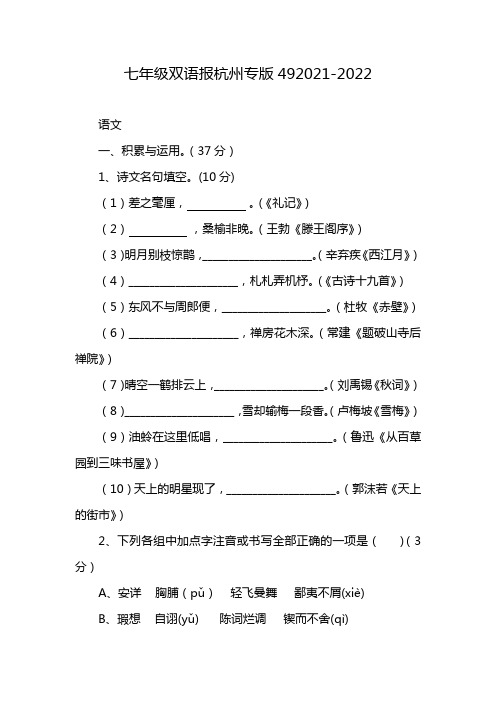
七年级双语报杭州专版492021-2022语文一、积累与运用。
(37分)1、诗文名句填空。
(10分)(1)差之毫厘,。
(《礼记》)(2),桑榆非晚。
(王勃《滕王阁序》)(3)明月别枝惊鹊,_____________________。
(辛弃疾《西江月》)(4)_____________________,札札弄机杼。
(《古诗十九首》)(5)东风不与周郎便,____________________。
(杜牧《赤壁》)(6)_____________________,禅房花木深。
(常建《题破山寺后禅院》)(7)晴空一鹤排云上,_____________________。
(刘禹锡《秋词》)(8)_____________________,雪却输梅一段香。
(卢梅坡《雪梅》)(9)油蛉在这里低唱,_____________________。
(鲁迅《从百草园到三味书屋》)(10)天上的明星现了,_____________________。
(郭沫若《天上的街市》)2、下列各组中加点字注音或书写全部正确的一项是()(3分)A、安详胸脯(pǔ)轻飞曼舞鄙夷不屑(xiè)B、瑕想自诩(yǔ)陈词烂调锲而不舍(qì)C、怠慢跻身(qí)邪魔鬼崇诲人不倦(huǐ)D、恣情干涸(hé)人迹罕至不屈不挠(náo)3、下列句子中加点的成语使用正确的一项是( ) (3分)A、对于南洋机场的工作人员来说,2014年机场旅客吞吐量增幅居全省第一是件值得可歌可泣的事情。
B、大家认为他提出的这条建议很有价值,都随声附和表示赞成。
C、上海外滩陈毅广场拥挤踩踏事故导致36人死亡,49人受伤。
这真是骇人听闻啊!D、在学习上就应该不耻下问,有不懂的问题就主动问老师。
4、下列句子没有语病的一项是()(3分)A、自公共自行车投入使用以来,盐城市区尚未发生一起车辆丢失、长时间不归还。
B、日前,学校开展的安全常识教育活动,可以增强同学们的自我安全保护。
(2014春)七年级报纸电子版·牛津深圳版(第14期)

(2014春)初一牛津报纸电子版(第14期)七年级(下)Unit 4 能力测试题听力部分(20)I. 听录音,选出你听到的句子。
句子念两遍。
(共5小题,每小题1分)( ) 1. A. How can a tree live?B. How long can a tree live?C. Where can a tree live?( ) 2. A. It can pass information to others.B. It can send information to others.C. It can pass information to people.( ) 3. A. He thanked me for my help.B. He thanked me for helping him.C. I thanked him for his help.( ) 4. A. Can you tell me when you leave?B. Can you tell me where you live?C. Can you tell me why you leave?( ) 5. A. There are more and more trees in the world.B. There are a few trees in the world.C. There are fewer and fewer trees in the world.II.听句子,根据所听内容选择最佳应答语。
句子念两遍。
(共5小题,每小题1分)( ) 6. A. Yes, it is. B. No, I don't.C. It's cold.( ) 7. A. Yes, it is cold. B. I'm studying.C. It's sunny now.( ) 8. A. I'm watching TV. B. They are talking.C. They are at home.( ) 9. A. Pretty good. B. I'm well.C. It is going to its home.( ) 10. A. Yes, he is. B. No, she isn't.C. She is a good girl.III.听对话,根据对话内容选择最佳答案。
(2014春)七年级报纸电子版·牛津深圳版(第19期)

(2014春)初一牛津报纸电子版(第19期)语法运用Grammar in use表示数量的不定代词的用法一、内容表示数量的不定代词有:(not) many,(not) much, too many, too much, (a) few, (a) little, a lot of/lots of, (not) enough, no…, 它们都可以修饰名词。
1. many, much表示“多”; few, little表示“少”; a few, a little表示“几个”。
2. too many表示“太多”, too much表示“太多”。
3. a lot of/lots of表示“很多”, no表示“没有”。
4. (not) enough表示“(不)足够”。
二、用法修饰可数名词的有: (not) many, too many, too few, few, a few注意: few表示否定意义, 意为“少(几乎没有)”, not many用在否定句子中。
1. I have many books in my schoolbag.我书包里有很多书。
2. There are not many flowers in the garden.花园里没有太多的花。
3. There are a few flowers in the garden.花园里有一些花。
4. There are few flowers in the garden.花园里几乎没有花。
5. She ate too many eggs and she was full.她吃了太多鸡蛋, 饱了。
6. She ate too few eggs and she was still hungry.她吃了太少的鸡蛋, 还在饿呢。
修饰不可数名词的有: (not) much, a little, little, too much, too little注意: little表示否定意义, 意为“少(几乎没有)”; not much用在否定句子中。
七年级暑假作业参考答案深圳报业出版社
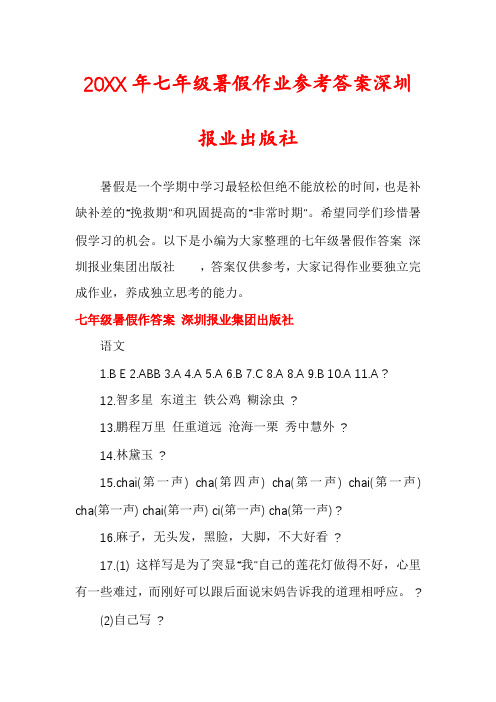
20XX年七年级暑假作业参考答案深圳报业出版社暑假是一个学期中学习最轻松但绝不能放松的时间,也是补缺补差的“挽救期”和巩固提高的“非常时期”。
希望同学们珍惜暑假学习的机会。
以下是小编为大家整理的七年级暑假作答案深圳报业集团出版社,答案仅供参考,大家记得作业要独立完成作业,养成独立思考的能力。
七年级暑假作答案深圳报业集团出版社语文1.B E2.ABB3.A4.A5.A6.B7.C8.A 8.A9.B 10.A 11.A ?12.智多星东道主铁公鸡糊涂虫?13.鹏程万里任重道远沧海一栗秀中慧外?14.林黛玉?15.chai(第一声) cha(第四声) cha(第一声) chai(第一声) cha(第一声) chai(第一声) ci(第一声) cha(第一声) ?16.麻子,无头发,黑脸,大脚,不大好看?17.(1) 这样写是为了突显“我”自己的莲花灯做得不好,心里有一些难过,而刚好可以跟后面说宋妈告诉我的道理相呼应。
?(2)自己写?例:在一年当中我最盼望的节日是六一(虽然我知道六一已经不属于我们)但看着比自己小的弟弟妹妹们开心的过着属于他们的六一,自己心里也会跟着他们莫名其妙的开心起来。
?第二单元?n(第二声) bu(第三声) chi(第四声) long(第三声) hui(第四声) dan(第四声) ?2.斓岖懊巅帐嚎?3.(1)电话,电视机,电脑,跑步机?(2)汽车,飞机,自行车?(3)椅子,电话?(4)跑步机,自行车?(5)汽车,飞机?4.A ?5. 黄河远去,白云一片,孤城万仞山。
羌笛何须怨?杨柳春风,不度玉门关。
?6.我选第二句,因为在这样的夜里,听到有人用笛吹奏着“折杨柳”的曲子,那充满伤感、思念的声音,又有谁听了不会油然兴起怀乡之情呢?沦落异乡的浪子,原本就思念故园,何况又在寂寞的深夜里,听到伤感的曲调,自然更加深了怀乡情愁。
?7.告诉我们世上的生物渐渐减少,我们应该保护资源,不浪费资源?8.人物:李大钊?理由:李大钊爱国,为国牺牲的精神,值得我们学习?9.(1)你飞的越高,离死亡的距离越近?(2)越重越危险?10.(1)蚕(2)鸟(3)黄鹂(4)鹦鹉(5)蜻蜓(6)鸭?11.(1)依依不舍(2)其乐无穷(3)默默无闻(4)万事俱备?12. 学校收到了出版社送来的很多本书?13.D ?14. 我是伟大的中国人民的儿子?15.(1)B(2)C ?16. 网络是一个虚拟的社会,同样也需要一种不同于现实的语言?17.(1)嗷(2)嘶(3)吠(4)吼(5)嚎(6)吱(7)啼(8)咩?18. 月、朋、日、明?19. 自吹自擂?第三单元?1. (1)pang(2)he(3)chuo(4)sui(5)he ?2. (1)膺(2)惹(3)锲(4)迥(5)孺(6)泣(7)裹(8)铤?3. (1)后事之师(2)不可言传(3)谬以千里(4)毛将焉附(5)宁为玉碎(6)殃及池鱼(7)意在沛公(8)近墨者黑(9)一叶障目?4. (班)(心)(禁)(没)(贷)(为)(阁)(历)(覆)(投)(妄)(趾)(滥)(失)(器)(荐) ?5. (1)废寝忘食,程门立雪,学以致用,牛角挂书?(2)心旷神怡,兴高采烈,心花怒放,喜出望外?(3)绿草如茵,青山绿水?6. (1)把“通过”去掉?(2)把“有”去掉?7.(1)闲敲棋子落灯花?(2)各领风骚数百年?(3)到乡翻似烂柯人?(4)造化钟神秀?(5)自缘身在最高层?(6)我寄愁心与明月?(7)关山度若飞?(8)雌兔眼迷离?(9)子曰:学而不思则罔,死而不学则殆?(10)人不知而不愠,不亦君子乎?(11)沉舟侧畔千帆过,病树前头万木春。
- 1、下载文档前请自行甄别文档内容的完整性,平台不提供额外的编辑、内容补充、找答案等附加服务。
- 2、"仅部分预览"的文档,不可在线预览部分如存在完整性等问题,可反馈申请退款(可完整预览的文档不适用该条件!)。
- 3、如文档侵犯您的权益,请联系客服反馈,我们会尽快为您处理(人工客服工作时间:9:00-18:30)。
Unit 5 Grammar语法运用【用一般将来时】一般将来时表示将来某个时间将要发生的动作或存在的状态,或表示将来经常或反复发生的动作。
常与tomorrow,next year , this Saturday, soon , in the fixture,in a moment等表示将来的时间状语连用。
一、含助动词will的一般将来时:用来谈论将要发生的事情。
will可以用于所有的人称代词。
例如:1. We will have an English class tomorrow morning.我们明天早上将有一节英语课。
2. I won’t fly kites with you next Sunday.下周日我将不去和你放风筝。
3. — Will she go to school this Saturday?这周六她将会去学校吗?—Yes, she will. / No, she won’t.是的,她将会去的。
/不,她将不会去。
总结:通过以上例句我们可以看出,含助动词will的一般将来时的结构如下:肯定句:主语+ will +动词原形+其他.否定句:主语+ will + not +动词原形:+其他(will not可缩写为won’t).一般疑问句:Will +主语+动词原形+其他?肯定回答:Yes,主语+ will.否定回答:No,主语+ won’t.二. be going to表示一般将来时:用来谈论事先打算,有意图要发生的动作,或者客观情况下即将要发生的事情。
be动词可以有am,is, are三种形式。
例如:1. I am going to have a picnic this afternoon.今天下午我将去野餐。
2. We aren’t goin g to swim this Saturday. 这周六我们将不会去游泳。
3. — Is he going to travel next year?他明年将要去旅行吗?—Yes,he is. / No, he isn’t.是的,他将要去。
/不,他将不会去。
总结:通过以上例句我们可以看出,be going to表示一般将来时的结构如下:肯定句:主语+ am / is / are + going to + 动词原形+其他.否定句:主语+ am / is / are + not + going to + 动词原形+其他.一般疑问句:Am / Is / Are +主语+ going to +动词原形+其他?肯定回答:Yes,主语+ am / is / are.否定回答:No,主语+ am / is / are + not.实战演练I.用所给词的适当形式填空。
1. ________ you________ (be) here this Sunday?2. I________ (come back) in a minute.3. He________ (leave) for Beijing tomorrow.4. She is quite busy now. She________ (not go) shopping with us.5. I ________ (go) to school in an hour.6. We________ (play) football tomorrow afternoon.7. ________ you ________ (come) here again tomorrow?8. She________ (have) an English exam next month.9. I ________ (swim) with my friends this afternoon.10. It’s cloudy outside. It________ (rain) soon.II. 根据汉语意思和括号内的提示,翻译句子。
11. 我明天不打算参加聚会。
(take part in)__________________________________________________________12. 我们明天下午将去打篮球。
(play basketball)__________________________________________________________13. 你下周日去公园吗?(go to the park)__________________________________________________________14. 她下个月将去美国旅行。
(travel to America)__________________________________________________________15.他们明天去看电影吗?(see a movie)__________________________________________________________III.根据对话内容,用所给词的正确形式填。
A: Hi, this is Mary. May I speak to Jason?B: Hi, Mary. This is Jason. How are you?A: Fine. Thank you. I 16. _________ (take) a trip to the Moon next Friday.B: Wow! 17. _________ your parents_________ (go) with you?A: Yes, they 18. _________.B: Great! How long are you going to stay on the Moon?A: We 19. _________ (stay) there for two days.B: Have a good time!A: Thank you very much. I 20. _________ (take) some photos of the Moon for you.B: That’s very nice of you. _________.IV.根据文段内容用所给词的适当形式填空。
Some students will travel to famous places during the summer holidays. Bruce 21. _________ (go) to Hainan. He 22. _________ (swim) in the sea. He also wants to eat the seafood. Alice will travel to Japan. She 23. _________ (take) a lot of photos there.Eric will visit Xi’an. He 24. _________ (eat) a lot of nice food there. Linda 25. _________ (not travel). She wants to stay with her parents at home. She will help her mother do the housework. Unit 5 短语聚会(Grammar-More practice)1. on the Moon 在月球上2. spend one’s holiday度假3. at the moment 目前4. in the future 将来5. have to do sth. 不得不做某事6. a large amount of 大量的7. get excited 变得兴奋8. a trip to 去......的旅行9. in the swimming pool 在游泳池里10. be able to do sth. 有能力做某事根据句意从上面选择适当的短语并用其正确形式填空,补全句子。
每空一词。
1. I feel very happy _________ _________ _________.2. He wants to be a doctor_________ _________ _________.3. Where do you want to_________ _________ _________?4. The old man gives_________ _________ _________ _________ money to his son.5. We will take_________ _________ _________ Guangzhou next month.6. I give my sister a new skirt. She_________ very_________.For Unit 5第四课时(Grammar)I.连词成句。
1. will this next I return not Friday book (.)______________________________________________________2. bring some you they will next books new time (.)______________________________________________________3. am to see I going movie a afternoon tomorrow (.)______________________________________________________4. he come next will back Sunday (?)______________________________________________________5. your grandparents to you going see tomorrow are (?)______________________________________________________II.根据括号内的要求,完成句型转换,每空一词, 缩写词算一个词。
6. They are going to eat breakfast outside tomorrow morning. (改为一般疑问句)_________ they _________ _________ _________ breakfast outside tomorrow morning?7. We will learn English next term. (对划线部分提问)_________ _________ you_________ next term?8. My brother will take part in a party this weekend. (改为否定句)My brother _________ _________ _________ _________ a party this weekend.9. The boy is going to play basketball. (将主语用these作限定词改为复数)_________ _________ _________ going to play basketball.10. — Is your mother going to cook the meal for us next time? (作否定回答)—_________,she_________.III. 用括号中的动词、will或be going to和正确的人称代词完成对话。
